‘Trắng từ buồng cây ra con sông’ Unfinished-letter for Gaza 2025 Art Auction for Palestine x Hoài Phương Mellingen Switzerland
Trắng từ buồng cây ra con sông.
Written and hand-drawn on dó paper, patched with recycled fabric, and a bundle of firewood gathered by the river.
![]()
For what happened last year, those events brought up things from the past, where I was born, a war that has never been fully seen through, the sound of live broadcasts from those in power because of money, the days my body had to purge because of the machines, the unethical meetings for brand X, going blind for many years. Now they all consume me awfully slowly and uncomfortably, (why) does my life have to change completely, have I-I have been wrong too many times while all this pain has pressed down for so long, and alas, everyone suffers except those who would only like to taste the other side of pain. What will I have left to write tomorrow if I can’t even plant a pot of vegetables, care for a piece of land, share openly, go and learn more, and just dive in and do before I even complain?
Written and hand-drawn on dó paper, patched with recycled fabric, and a bundle of firewood gathered by the river.

For what happened last year, those events brought up things from the past, where I was born, a war that has never been fully seen through, the sound of live broadcasts from those in power because of money, the days my body had to purge because of the machines, the unethical meetings for brand X, going blind for many years. Now they all consume me awfully slowly and uncomfortably, (why) does my life have to change completely, have I-I have been wrong too many times while all this pain has pressed down for so long, and alas, everyone suffers except those who would only like to taste the other side of pain. What will I have left to write tomorrow if I can’t even plant a pot of vegetables, care for a piece of land, share openly, go and learn more, and just dive in and do before I even complain?

I press my pen on the paper: an old friend thinking about this strange time, angry yet wanting to forgive, grieving in a long letter, a stretch of river, a bush. Everything might be as simple as that, and yet it takes so much effort to discard a little and return closer to what has nurtured me. Writing and mending, repairing, just patching and fixing. Perhaps I must repair it in order to move forward because repairing is not just for myself.


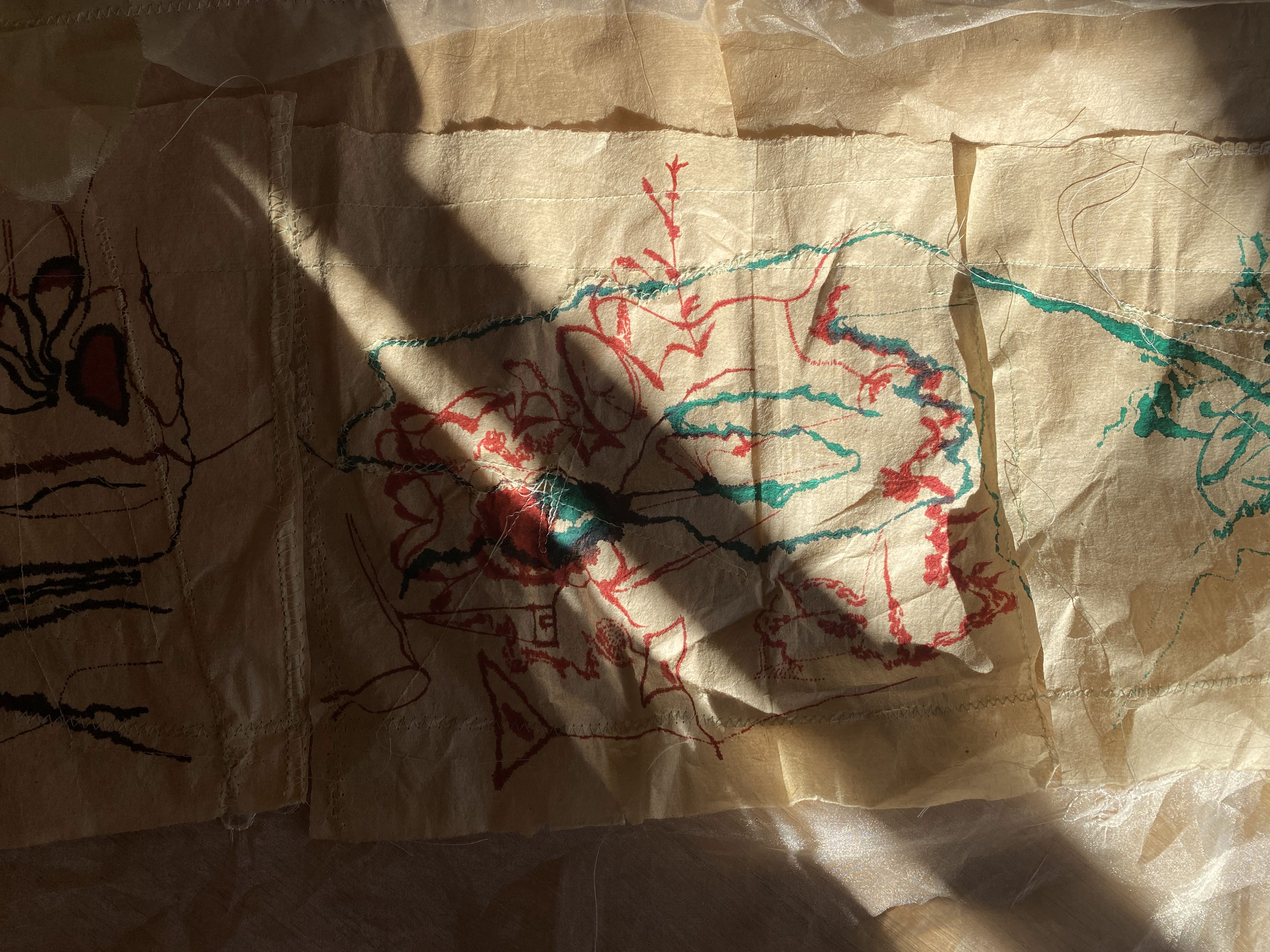






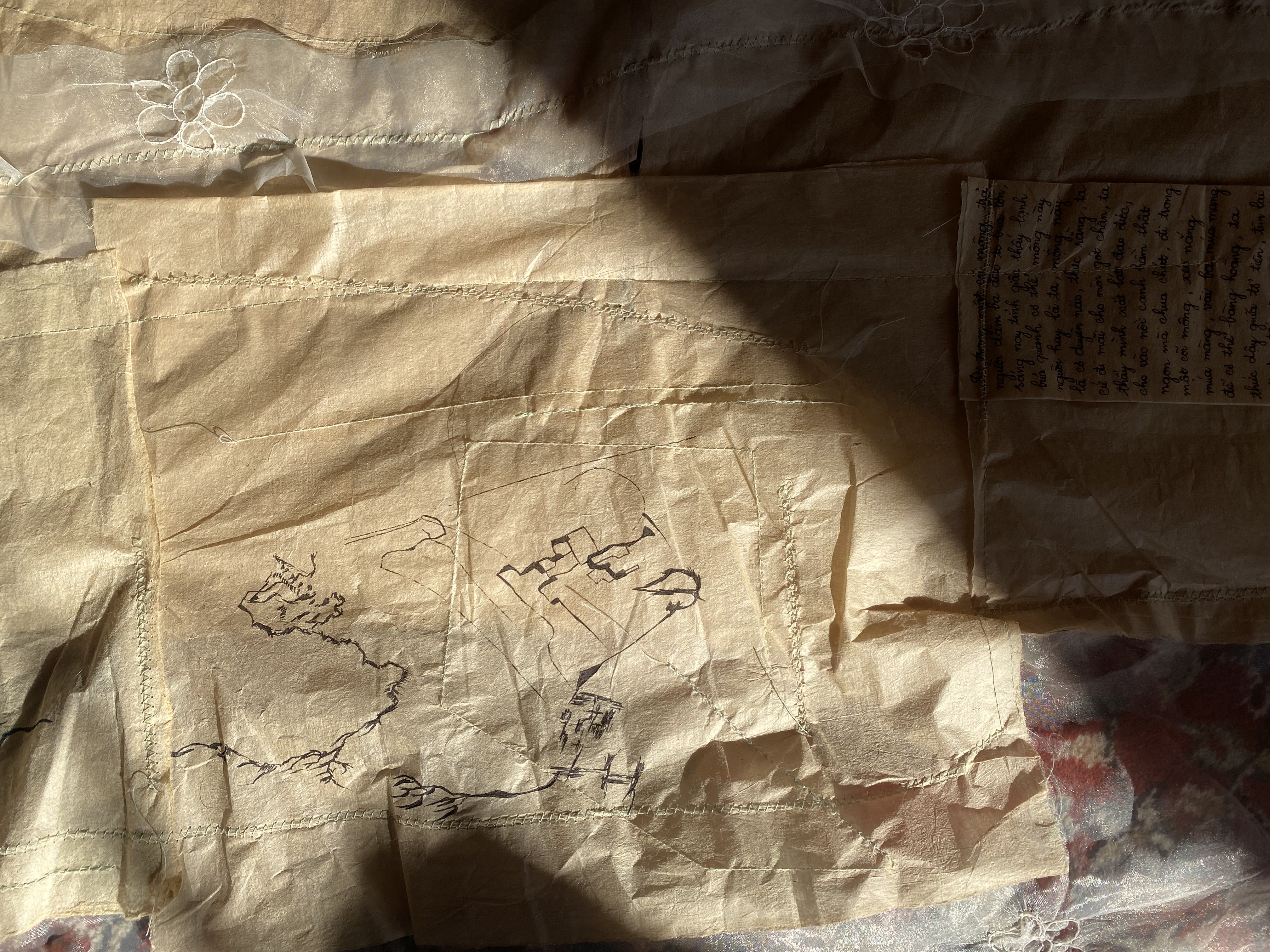



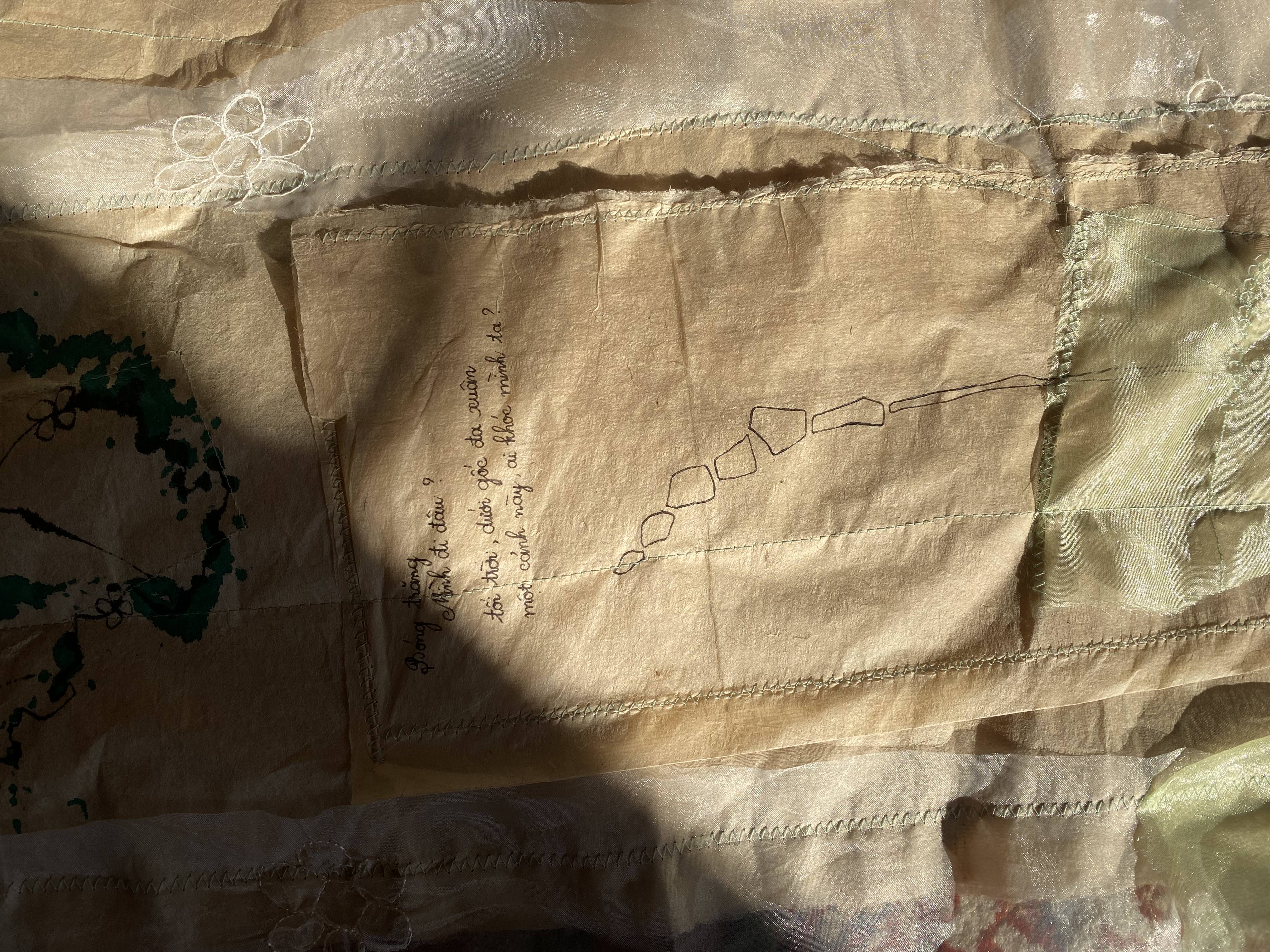
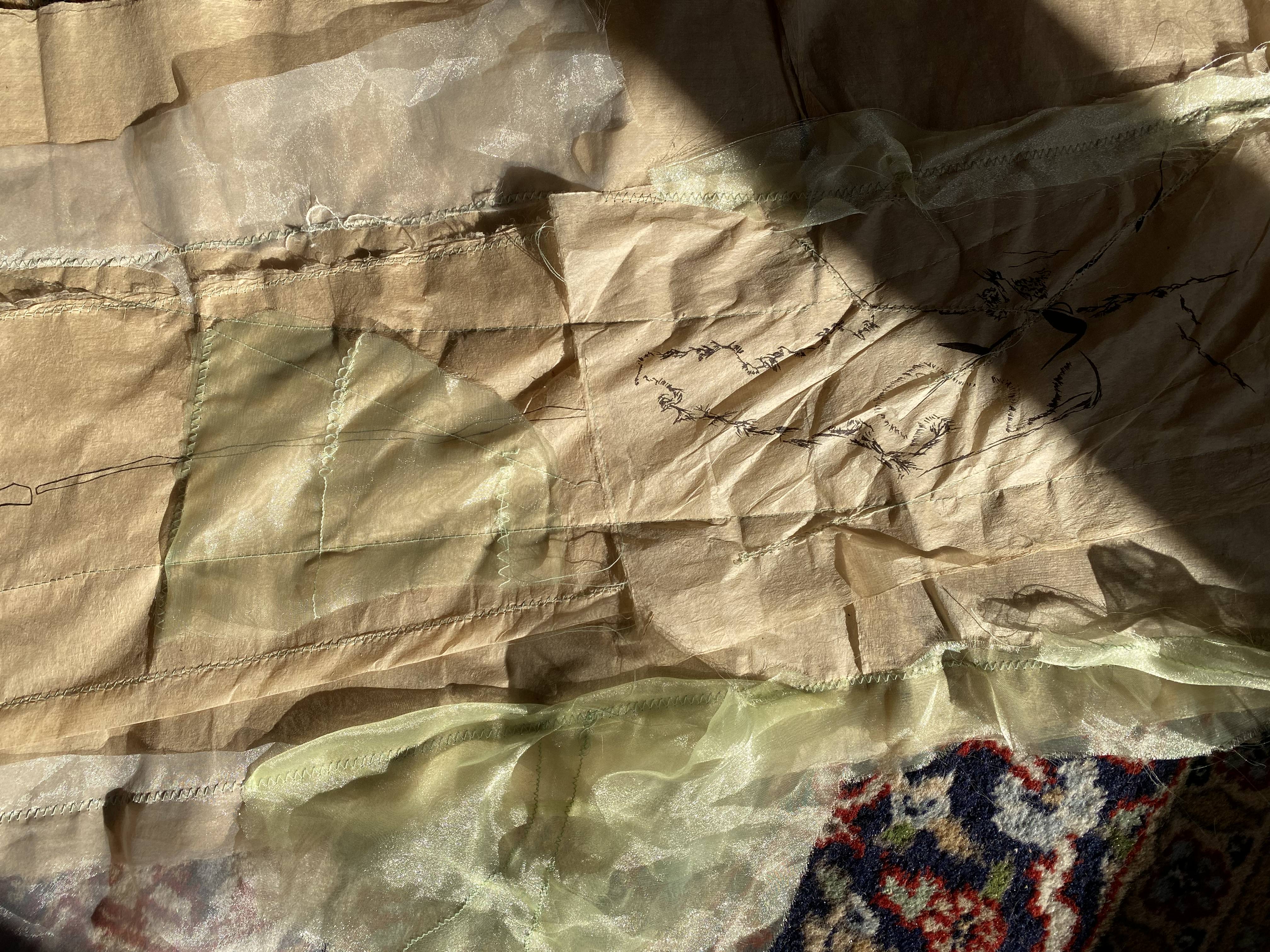
The paper was sent as a gift by chị Phương - a persistent comrade&artist&fundraiser&.. who organized this Art Auction for Mohammed, their sisters, and the Water charity fund.
‘...’ Poetry Reading 2024 Thơ Palestine x Ajar Publisher Fundraising Online Event
PAIN-FREEDOM-WE
CHAPTER 1 : PAIN
“You think your pain and your heartbreak are unprecedented in the history of the world, but then you read. It was books that taught me that the things that tormented me most were the very things that connected me with all the people who were alive, who had ever been alive.”
: lời thơ 'thương người tôi đi' :
giữa màu xanh của trời và của biểnchị chỉ thấy màu nâu của đất màu hồng đã nhuốm xuống để nằm xuốngchị khóc giữa mưa trời lành xót thương lành
người lành lặn cứ yên tâm ở trong lành lặn, người thiếu đi một phần cơ thể, đó là rễ cây tán lá, là tiếng thở của nguồn nước, phấp phới rễ cây, mọc thẳng từ phân tranh của những người di tản, trên con tàu đêm, người đi tìm phần đã mất, hoạ hoang mang lang thang đãng trí, tất cả đều trở nên đãng trí vì không còn mảnh ghép nào từ tổ tiên để lại, bức hình dung nhoà đi dưới kệ bàn, xoa mũi lên chân cúi gằm đầu xuống đất, ngửi mùi ở đâu cũng thấy mùi của lành lặn và hiền hoà, có lẽ như một bát canh trưa, cho thì uống không cho thì tranh nhau mà uống để cơ thể ai cũng thật lành lặn, thật tức tưởi, cái tâm này siết lại thật tức tưởi vì những kẻ lành lặn.
cái nắm cửa tay đã khuất người nằm bất khuấtđứa trẻ trong tấm ảnh và không còn định lý của thời gian
trời cho biết bấy nhiêu trở thành bao nhiêutrời ơi tro tàn đứng thở một hồn nóng cắt nửa đùm haitới đây thôi đặng rồi nay nữa mai đâu?
rửa tấm thân trong bọc mỡ mặt màymặt này hay mặt người dửng dừng dưng còn rảy đục này
hắn hay những kẻ chân không rảy mực trên những tờ giấy trắng
gằn họng
ôi thôi thôi thôi thôi thôi thôi thôi thôi
nắng vẹm chân thương lòng căm uất
cởi ra đi, xin hãy cởi ra đicho người tôi đithương ngườitôi đicho ngườitôi đithương người tôi đicho người tôi đithương người tôi đicho ngườitôi đithương ngườitôi đi
tôi đi đâu?
CHAPTER 2 : FREEDOM
“Freedom is not something that anybody can be given; freedom is something people take and people are as free as they want to be. One hasn’t got to have an enormous military machine in order to be un-free when it’s simpler to be asleep, when it’s simpler to be apathetic, when it’s simpler, in fact, not to want to be free, to think that something else is more important.”
: lời thơ và nhạc từ trình diễn 'xanh xanh' :
/ . /
khi tôi nói về đơn giản, đó là, ánh trăng của đêm nay
nắng hè-hạ xuống-cắt ngang-xén nửa-bầu má à thôi tiếng cười rơi xuống đườnglàm đá phiêu diêu trời ngả màu tiêu diêu xướng lời thương mĩ miều
em không tìm thấy mình trong màu nước nơi thế gian cùng rời đi và trở về tận cùng
khi em nói về đơn giản, đó là, chậu nước của mưa trời
/ .. /
từ vạn dặm nắm tayngười tìm nơi ẩn trú tìm thấy em để nắm tayrồi người thấy người để nắm taytừ vạn dặm khi tôi nói về đơn giảnđó là, thấy em đêm nay tìm em khép giữa nghìn lớp lá xanh xanh
/ ... /
mang máng như vậy, tôi nhớ Eileen đã nhoẻn cười từ vạn dặm xanh xanh, tôi mở mắt ra, mở đôi tay này, mở cả cơ thể để cát bụi hoà vào người, để tiếng bom và tiếng người nằm trên đầu mỗi tối, mang máng như vậy, tôi nghe tên của Eileen, khiếp sợ giữa những cái tên bị quên lãng, vì những kẻ sợ quên lãng, làm vạn người tan đi trong quên lãng, mở hết ra, mở cả cơ thể này ra, không có cách nào tìm được, không tìm được em, không chạm được em, mang máng như vậy, tôi nhớ Eileen, một cái tên
/ .... /
em tìm em nem nép bẽn lẽn nhem nhépngười em ướt cơn mưa chiều giữa lều giữa biển giữa sự thật giận dữ như dải sóng dội lênnhững tay người vuốt cằm tay người giáng xuống đau thương tràn xiết câm điếc giữa lòng ô liu những tay người nắm lấy em rồi thả ra như cát dã tràng mọi thứ muộn màng không nghe tiếng em long đong làn nước
/ ..... /
đêm naykhi tôi nói về đơn giản,đó là, ánh trăng của đêm nay là em là em hứng mình để tìm mình trong nước là em hứng mình để tìm mình trong nước
tìm mình trong nướcđêm trong nướcem trong nướctrong em
đêm nay xin em cứ ở trong xin thêm người nắm tay người tìm nơi ẩn trú em và người ở trong
người tìm nơi ẩn trú em và người ở trong
CHAPTER 3 : WE
“A country is only as good… only as strong as the people who make it up and the country turns into what the people want it to become… I don’t believe any longer that we can afford to say that it is entirely out of our hands. We made the world we’re living in and we have to make it over.”
(Three quoted paragraph comes from James Baldwin)
“You think your pain and your heartbreak are unprecedented in the history of the world, but then you read. It was books that taught me that the things that tormented me most were the very things that connected me with all the people who were alive, who had ever been alive.”
: lời thơ 'thương người tôi đi' :
giữa màu xanh của trời và của biểnchị chỉ thấy màu nâu của đất màu hồng đã nhuốm xuống để nằm xuốngchị khóc giữa mưa trời lành xót thương lành
người lành lặn cứ yên tâm ở trong lành lặn, người thiếu đi một phần cơ thể, đó là rễ cây tán lá, là tiếng thở của nguồn nước, phấp phới rễ cây, mọc thẳng từ phân tranh của những người di tản, trên con tàu đêm, người đi tìm phần đã mất, hoạ hoang mang lang thang đãng trí, tất cả đều trở nên đãng trí vì không còn mảnh ghép nào từ tổ tiên để lại, bức hình dung nhoà đi dưới kệ bàn, xoa mũi lên chân cúi gằm đầu xuống đất, ngửi mùi ở đâu cũng thấy mùi của lành lặn và hiền hoà, có lẽ như một bát canh trưa, cho thì uống không cho thì tranh nhau mà uống để cơ thể ai cũng thật lành lặn, thật tức tưởi, cái tâm này siết lại thật tức tưởi vì những kẻ lành lặn.
cái nắm cửa tay đã khuất người nằm bất khuấtđứa trẻ trong tấm ảnh và không còn định lý của thời gian
trời cho biết bấy nhiêu trở thành bao nhiêutrời ơi tro tàn đứng thở một hồn nóng cắt nửa đùm haitới đây thôi đặng rồi nay nữa mai đâu?
rửa tấm thân trong bọc mỡ mặt màymặt này hay mặt người dửng dừng dưng còn rảy đục này
hắn hay những kẻ chân không rảy mực trên những tờ giấy trắng
gằn họng
ôi thôi thôi thôi thôi thôi thôi thôi thôi
nắng vẹm chân thương lòng căm uất
cởi ra đi, xin hãy cởi ra đicho người tôi đithương ngườitôi đicho ngườitôi đithương người tôi đicho người tôi đithương người tôi đicho ngườitôi đithương ngườitôi đi
tôi đi đâu?
CHAPTER 2 : FREEDOM
“Freedom is not something that anybody can be given; freedom is something people take and people are as free as they want to be. One hasn’t got to have an enormous military machine in order to be un-free when it’s simpler to be asleep, when it’s simpler to be apathetic, when it’s simpler, in fact, not to want to be free, to think that something else is more important.”
: lời thơ và nhạc từ trình diễn 'xanh xanh' :
/ . /
khi tôi nói về đơn giản, đó là, ánh trăng của đêm nay
nắng hè-hạ xuống-cắt ngang-xén nửa-bầu má à thôi tiếng cười rơi xuống đườnglàm đá phiêu diêu trời ngả màu tiêu diêu xướng lời thương mĩ miều
em không tìm thấy mình trong màu nước nơi thế gian cùng rời đi và trở về tận cùng
khi em nói về đơn giản, đó là, chậu nước của mưa trời
/ .. /
từ vạn dặm nắm tayngười tìm nơi ẩn trú tìm thấy em để nắm tayrồi người thấy người để nắm taytừ vạn dặm khi tôi nói về đơn giảnđó là, thấy em đêm nay tìm em khép giữa nghìn lớp lá xanh xanh
/ ... /
mang máng như vậy, tôi nhớ Eileen đã nhoẻn cười từ vạn dặm xanh xanh, tôi mở mắt ra, mở đôi tay này, mở cả cơ thể để cát bụi hoà vào người, để tiếng bom và tiếng người nằm trên đầu mỗi tối, mang máng như vậy, tôi nghe tên của Eileen, khiếp sợ giữa những cái tên bị quên lãng, vì những kẻ sợ quên lãng, làm vạn người tan đi trong quên lãng, mở hết ra, mở cả cơ thể này ra, không có cách nào tìm được, không tìm được em, không chạm được em, mang máng như vậy, tôi nhớ Eileen, một cái tên
/ .... /
em tìm em nem nép bẽn lẽn nhem nhépngười em ướt cơn mưa chiều giữa lều giữa biển giữa sự thật giận dữ như dải sóng dội lênnhững tay người vuốt cằm tay người giáng xuống đau thương tràn xiết câm điếc giữa lòng ô liu những tay người nắm lấy em rồi thả ra như cát dã tràng mọi thứ muộn màng không nghe tiếng em long đong làn nước
/ ..... /
đêm naykhi tôi nói về đơn giản,đó là, ánh trăng của đêm nay là em là em hứng mình để tìm mình trong nước là em hứng mình để tìm mình trong nước
tìm mình trong nướcđêm trong nướcem trong nướctrong em
đêm nay xin em cứ ở trong xin thêm người nắm tay người tìm nơi ẩn trú em và người ở trong
người tìm nơi ẩn trú em và người ở trong
CHAPTER 3 : WE
“A country is only as good… only as strong as the people who make it up and the country turns into what the people want it to become… I don’t believe any longer that we can afford to say that it is entirely out of our hands. We made the world we’re living in and we have to make it over.”
(Three quoted paragraph comes from James Baldwin)
‘LILIPIPI first piece write for Eileen’ with Christian Nguyen Poetry performance 2024 Hát nhỏ như lời nguyện cầu Sài Gòn Việt Nam
I came up with the poem written for Eileen - Mohammed’ younger sister. As Christian - my partner/LILIPIPI project collaborator has been trying to help them for a while through Hoai Phuong fundraiser, we vaguely know her through pictures, videos, and stories.
People say poetry is born for imagination. Probably not in this case as it is the only thing I can do.
Chrisitan heard the poem in Vietnamese together with the English translation, he came up with a piece of music along with it.
![]()
![]()
![]()
![]()
![]()
![]()
![]()
![]()
Documented by Triết, Yến & Tâm Đỗ
People say poetry is born for imagination. Probably not in this case as it is the only thing I can do.
Chrisitan heard the poem in Vietnamese together with the English translation, he came up with a piece of music along with it.
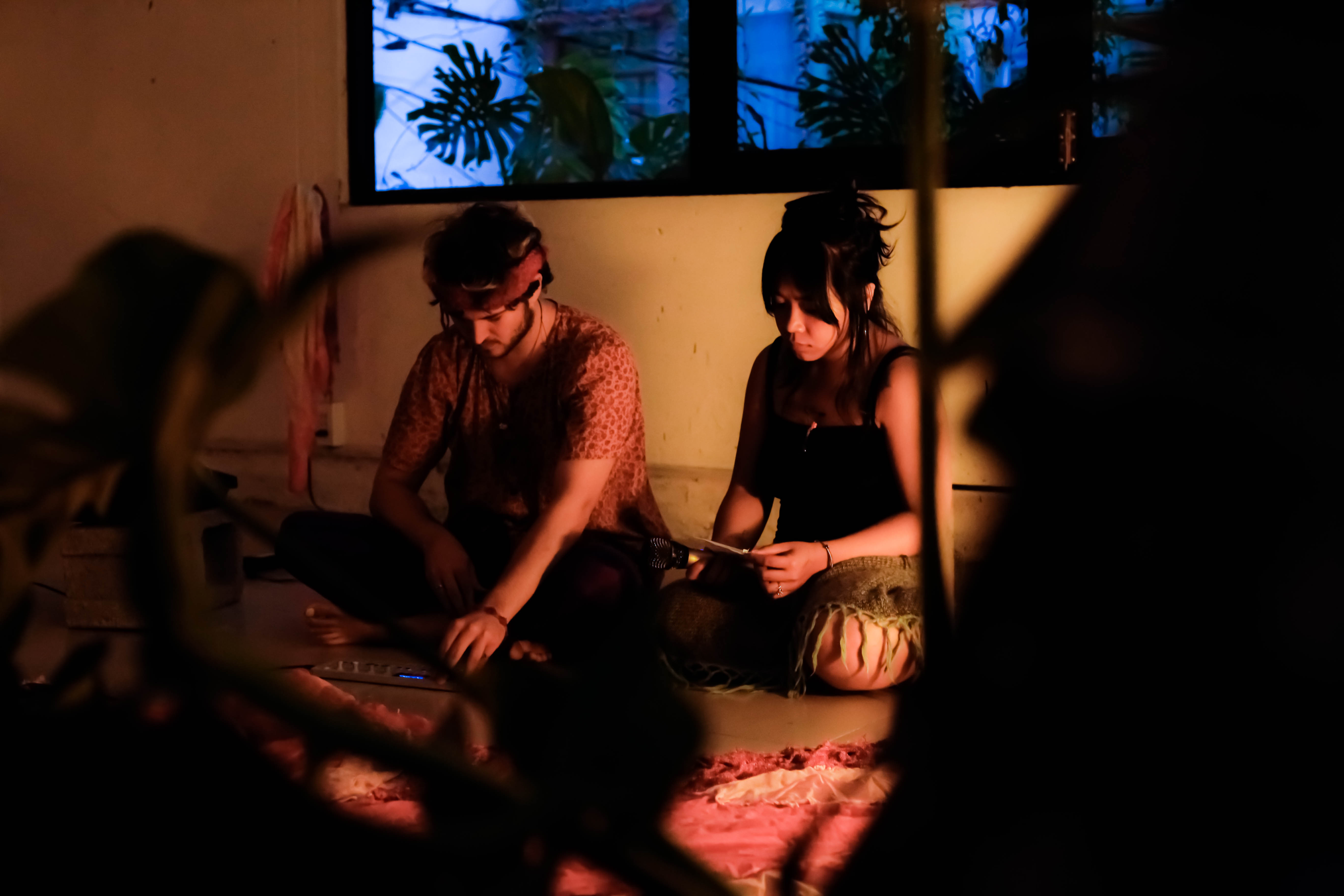
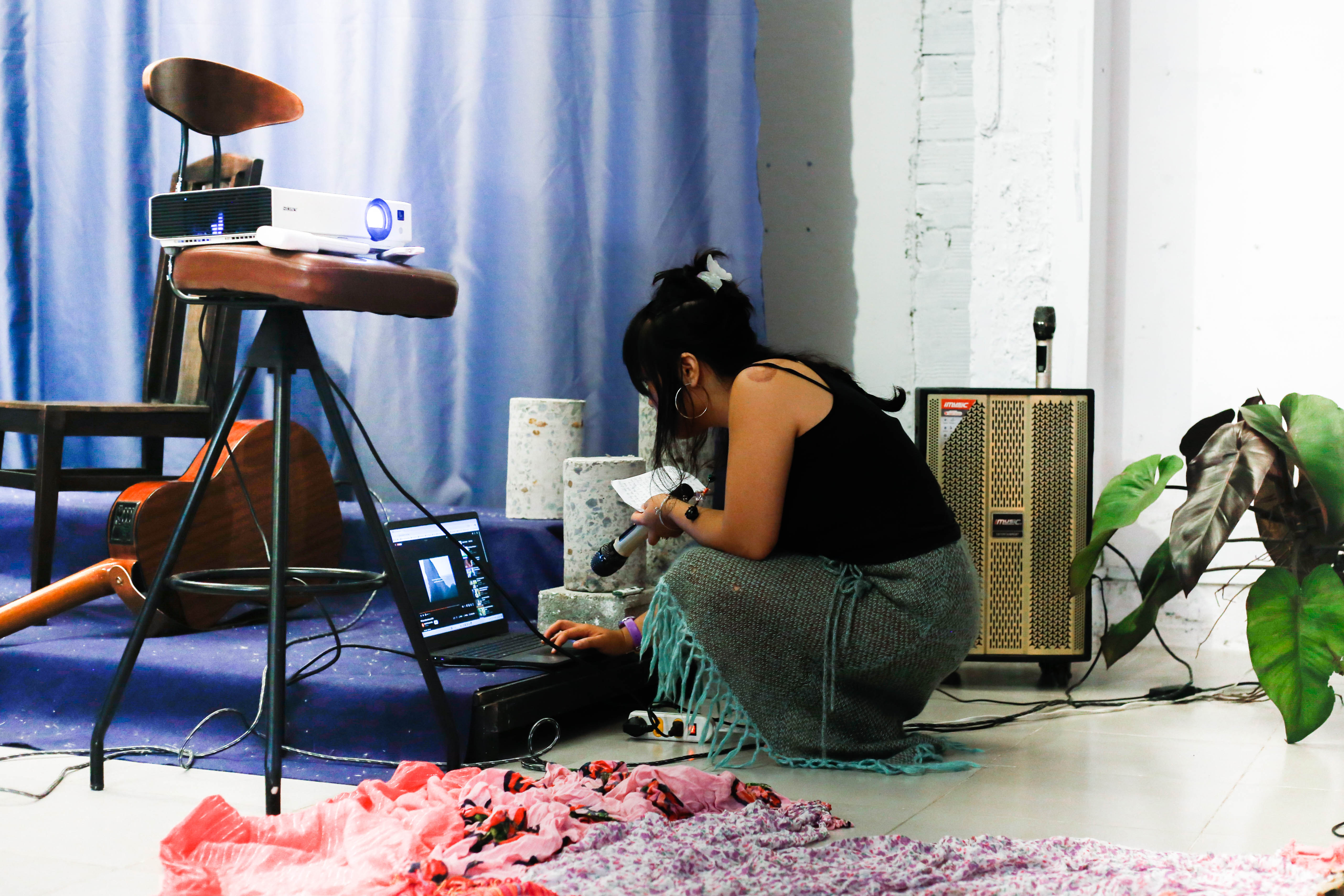
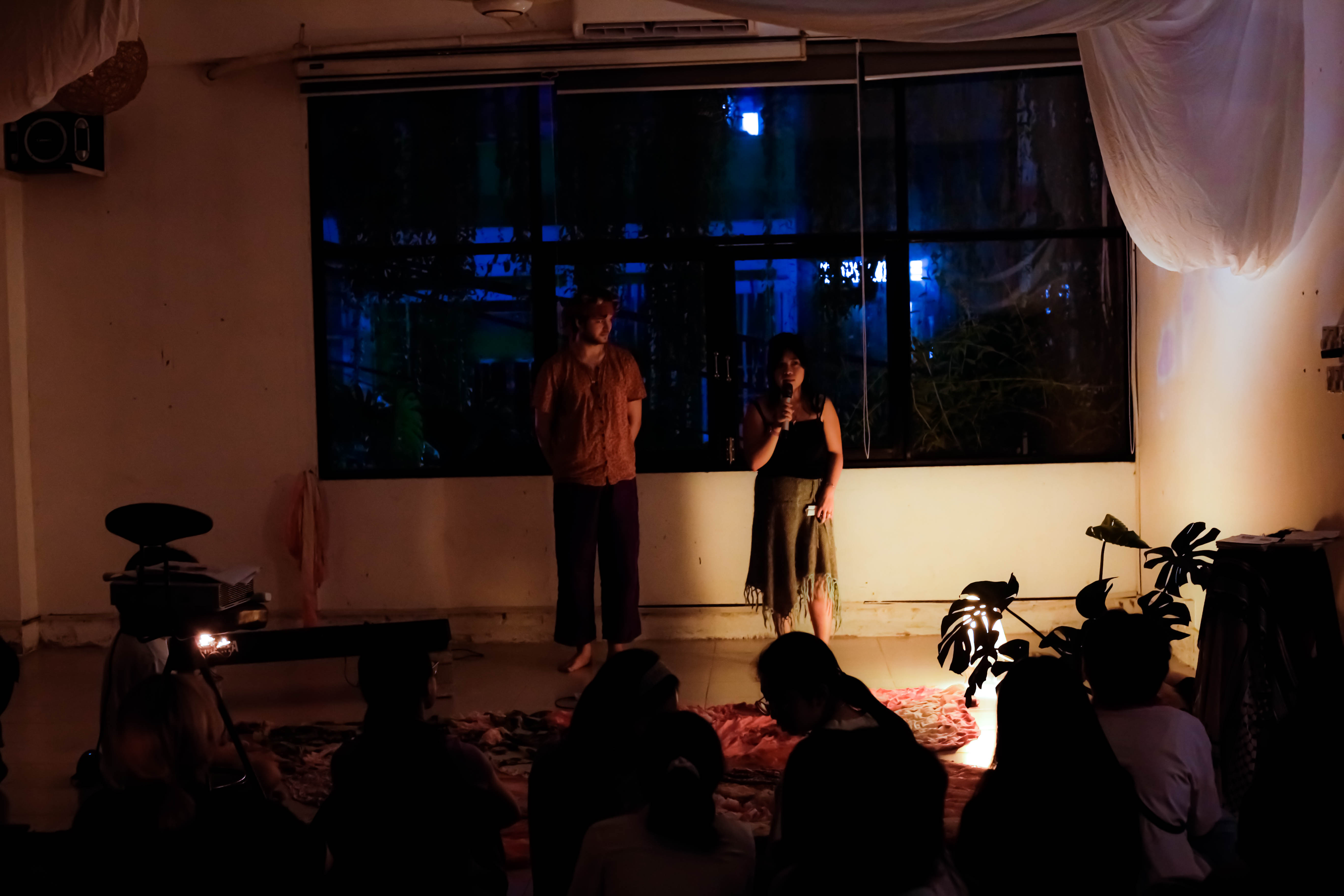

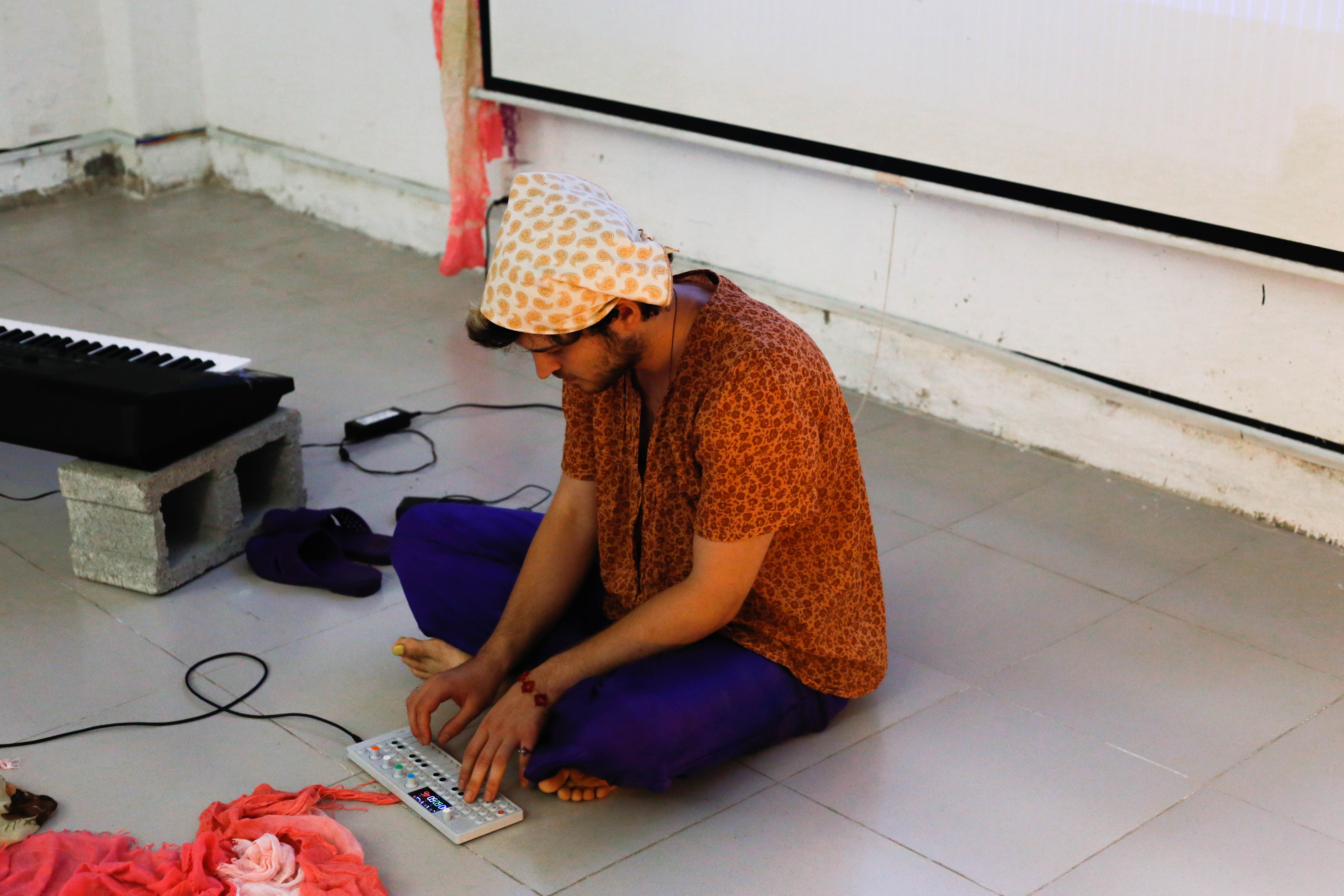
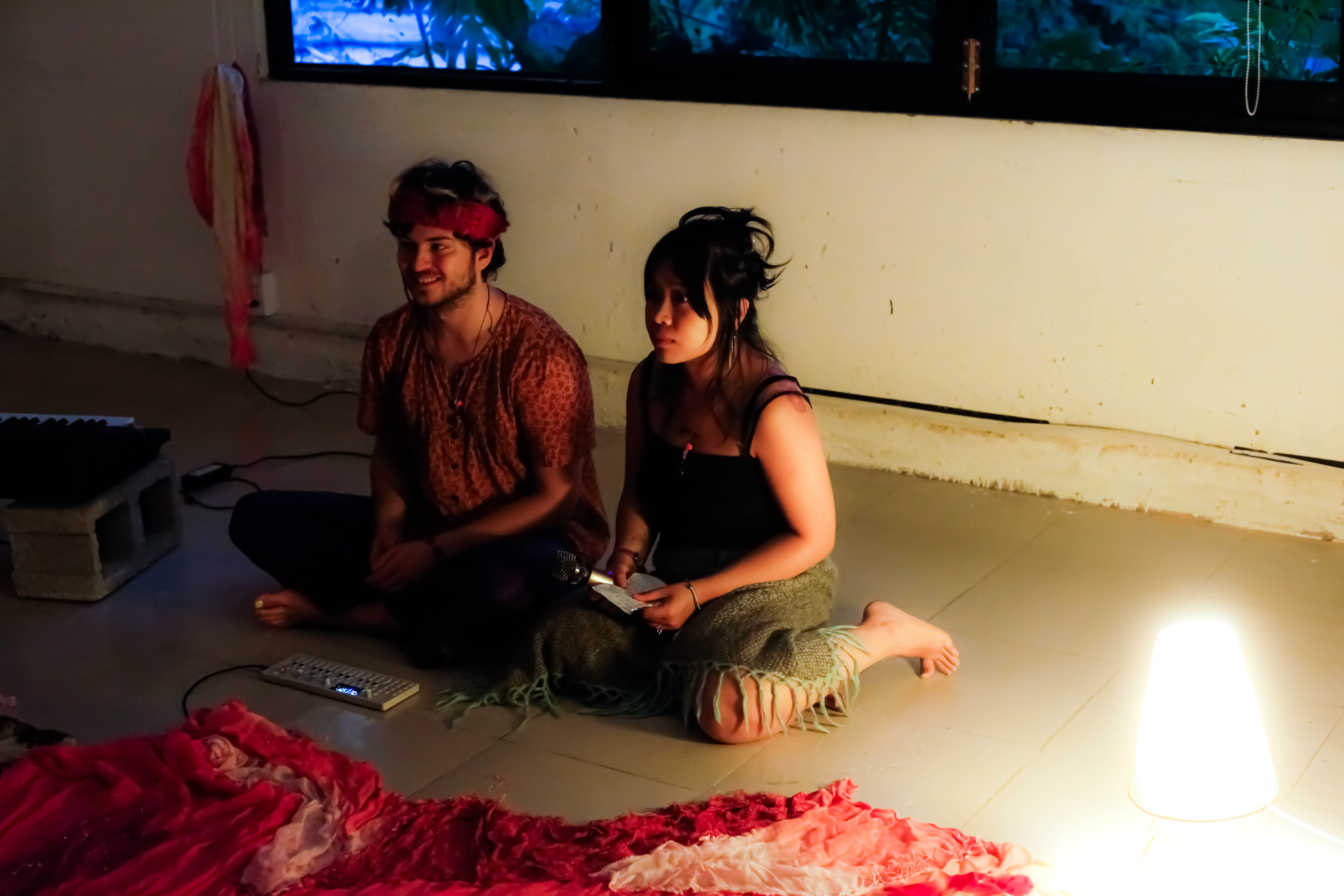

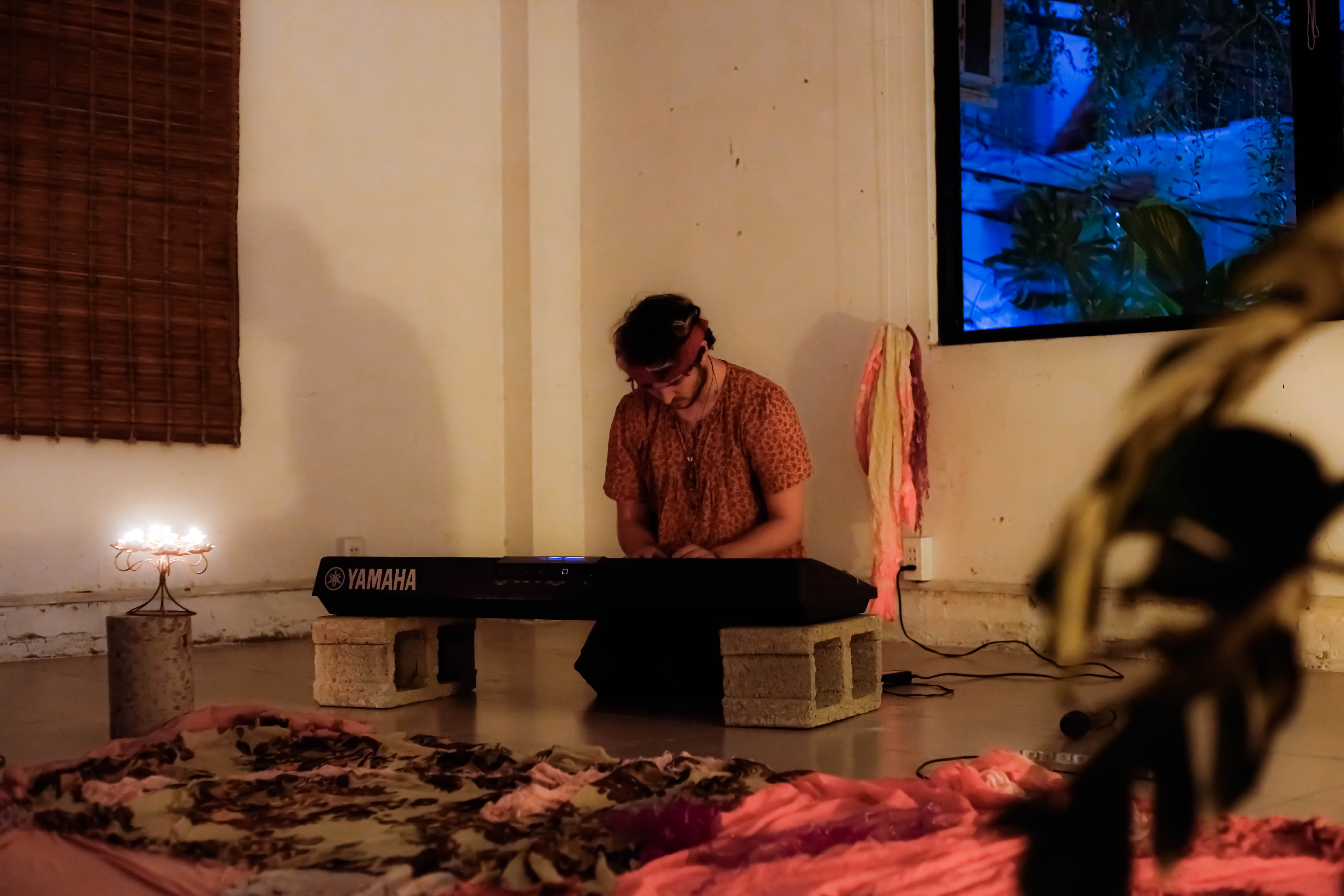
Documented by Triết, Yến & Tâm Đỗ
We presented at a small gathering in Saigon in 2024, organized by a young comrade who contacted me a long time ago. It was warm, emotional, and hopeful in despair.
‘Will your silence hear us?’ Poetry Video 2024 MA Intercultural Practices Showcase Central Saint Martins London UK
Inter-intimacy is a concept that I am developing to encounter the other using poetry as a vehicle. It refers to the proximate space of closeness built up between two entities as they coexist and engage with one another through careful cultivation of empathy, listening, and mutual understanding.
The film is my effort to speak with the other amidst interconnected realities.
See more
The film is my effort to speak with the other amidst interconnected realities.
See more
‘Mọi thứ thật giản đơn’ Poetry Video 2024 Group Show NEW WORLD MAY DAY Lethaby Gallery London UK
The poem was written in 2020 during the pandemic time now represented in moving image form. A response for me hasn’t gone away yet with its simplicity. A reminder. A possibility in this linear time.
Through the lens of the others, we see different chaos from us. I am a product of culture, of time, of ancestors, of war, of existence, myself. For now, with the urgency of humanity, I sit down to ponder things slowly.
Everything is so simple, isn't it?
SOS, Mayday! I would send you the signal of possibilities for the future, the imaginations of our generation, our responsibilities, our commitment, our circle, and our community. I would sit with you in the uncertain, stirring the empathy.
See more
Everything is so simple, isn't it?
SOS, Mayday! I would send you the signal of possibilities for the future, the imaginations of our generation, our responsibilities, our commitment, our circle, and our community. I would sit with you in the uncertain, stirring the empathy.
See more